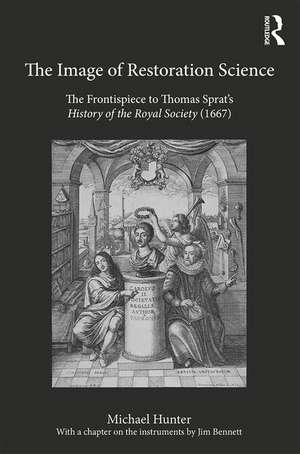The Image of Restoration Science: The Frontispiece to Thomas Sprat’s History of the Royal Society (1667)
Autor Michael Hunteren Limba Engleză Hardback – 14 dec 2016
| Toate formatele și edițiile | Preț | Express |
|---|---|---|
| Paperback (1) | 258.91 lei 6-8 săpt. | |
| Taylor & Francis – 29 aug 2022 | 258.91 lei 6-8 săpt. | |
| Hardback (1) | 848.55 lei 6-8 săpt. | |
| Taylor & Francis – 14 dec 2016 | 848.55 lei 6-8 săpt. |
Preț: 848.55 lei
Preț vechi: 1216.29 lei
-30% Nou
Puncte Express: 1273
Preț estimativ în valută:
162.37€ • 169.98$ • 134.35£
162.37€ • 169.98$ • 134.35£
Carte tipărită la comandă
Livrare economică 05-19 aprilie
Preluare comenzi: 021 569.72.76
Specificații
ISBN-13: 9781472478726
ISBN-10: 147247872X
Pagini: 166
Ilustrații: 84 Halftones, black and white; 84 Illustrations, black and white
Dimensiuni: 156 x 234 x 2 mm
Greutate: 0.5 kg
Ediția:1
Editura: Taylor & Francis
Colecția Routledge
Locul publicării:Oxford, United Kingdom
ISBN-10: 147247872X
Pagini: 166
Ilustrații: 84 Halftones, black and white; 84 Illustrations, black and white
Dimensiuni: 156 x 234 x 2 mm
Greutate: 0.5 kg
Ediția:1
Editura: Taylor & Francis
Colecția Routledge
Locul publicării:Oxford, United Kingdom
Cuprins
List of Illustrations
Acknowledgments
Abbreviations
1. Introduction
2. John Beale, ‘Lord Bacon’s Elogyes’ and the fortunes of Sprat’s History
3. The overall design of the frontispiece: sources and significance
4. Details: the portraits, books and institutional accoutrements of the Royal Society
5. The instruments. By Jim Bennett
6. The publication and dissemination of the print
7. Conclusion
Index
Acknowledgments
Abbreviations
1. Introduction
2. John Beale, ‘Lord Bacon’s Elogyes’ and the fortunes of Sprat’s History
3. The overall design of the frontispiece: sources and significance
4. Details: the portraits, books and institutional accoutrements of the Royal Society
5. The instruments. By Jim Bennett
6. The publication and dissemination of the print
7. Conclusion
Index
Notă biografică
Michael Hunter, FBA, is Emeritus Professor of History in the Department of History, Classics and Archaeology at Birkbeck College, University of London. He is the author of numerous books, including Boyle: Between God and Science (2009); Boyle Studies: Aspects of the Life and Thought of Robert Boyle (1627-91) (2015) and The Boyle Papers: Understanding the Manuscripts of Robert Boyle (2007); and is editor of Printed Images in Early Modern Britain: Essays in Interpretation (2010).
Recenzii
"Historians of art, the book and print-making will benefit from reading it just as much as historians of science. It is a gem." - Ludmilla Jordanova, University of Durham, Notes and Records of the Royal Society
Descriere
This book is about a single image - John Evelyn's frontispiece to Thomas Sprat’s History of the Royal-Society of London (1667). Providing a full analysis of the image in its Royal Society setting and the wider world of early-modern science, the book first considers the overall iconography of the image and its message concerning Evelyn’s conception of the society’s role, before moving on to examine details included in the plate and their significance. It concludes by considering the print’s history after publication, including the extent to which Evelyn used copies to exemplify the combination of technological and artistic accomplishment to which he believed the society should aspire.
